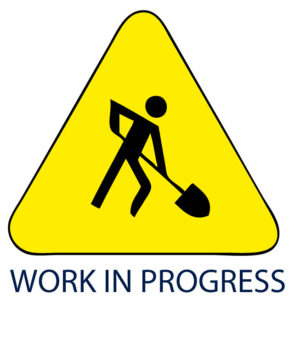Failed Goal = Wasted Time?


But steady progress is hard to measure, especially if it’s a .001% improvement or a 1% improvement per day. But it’s exactly this kind of improvement over 5 years that would completely change your life several times over.
So, we humans have figured out a way to better track progress… or so we think. It’s a powerful tool that every self-help coach, engineer and teacher uses… Goals.
Goals, as we’re taught, should be well defined with trackable markers and defined time frames. This allows us to see our progress, to know when we’ve had success and also when it’s time to shoot for a larger target. There are several hundred-page books all about making good goals. And it’s pretty common knowledge that the best movers and shakers always have them, review them and achieve them.
Except that many times they FAIL.
Almost every successful person I know fails at several goals each year.
Why Have Goals?
If we know that it’s likely for us to fail at least a certain percentage of all the goals we set… why not just sit on the couch all day watching some awful reality TV show? Are we being masochistic for even setting goals in the first place?
Well, my answer is focus. When we have a goal, we narrow our focus. We put ourselves under a microscope, we take notes, we observe ourselves and do things differently.
Without this change in focus, which I believe leads to a change in behavior, it’s highly unlikely that we will actually get up off the couch and do something different. We humans love our habits and routines, especially the lazy ones. And in case you’re wondering, yes I just watched 10 hours of NCAA basketball.
But during that 10-hour marathon of March Madness I also did pull-ups, air squats, ate a bunch of bacon, did pushups, had some carrots and did some bicep curls. 4 years ago, this activity would have read differently – drink beer, eat chips, get up for door, pay pizza man, return to couch… repeat.
Was it my goal to live as healthy as possible that changed my behavior? Maybe… but it’s likely it only had a small effect. Much more likely was my recent goal to lose 4 inches off my waist and try to find those elusive abs that my anatomy textbook tells me I have.
See, long-term goals are always easier to compromise on. If the consequences don’t provide immediate feedback, it can be very hard to respect them. Short-term goals change the focus and the time-frame of consequences.
Of course, when you stack them together you get the best of both worlds:
A short-term change in focus and behavior and long-term arc of behavior to strive for.
Failed Goals vs. Progress – What Matters Most?
Would you say the following people are failures?
John’s trying to triple his freelance revenue from $50,000 to $150,000 this year. His family has grown to 4 total in the past year and they are counting on him. But after doing his best, December rolls around and he’s only made $110,000 this year. He can’t take his wife on the vacation he was secretly planning and he has to admit to those around him that he didn’t achieve his goals. Despite a 120% improvement, he feels shame and sadness.
Sallie is overweight and looking to get the body of her dreams. Her short-term goal is to lose 60 pounds to get down to a more average weight for her height. She gives herself 6 months. She thinks 10 pounds a month is a great goal and so do her supporters. Unfortunately, she only loses 50 pounds. She’s been telling everyone for months about what her new weight will be and she’s just missed it by 10 pounds.
Bethany has decided this year she’s going to cross finishing a marathon off her bucket list. She signs up for a marathon 12 weeks from now. She’s already been running a few miles a week so she’s not totally out of shape. She hires a coach and gets some sweet new shoes. As the weeks go on, she’s on schedule and is hitting new records like running 13 miles and then 16 miles. Then, two weeks before the race she pulls her hamstring as she finishes a 20-mile run. She can’t hardly walk, let alone race. She’s devastated, yet 10 weeks ago she hadn’t ever run further than 5 miles in a day.
Probably not. As a family member, friend or loved one, we’d celebrate all of their successes. Yet, if you interviewed these people, the overwhelming feeling you’d likely get is one of disappointment and failure. (Hopefully not bordering on self-pity, defeat or anger, because I’ve been there.) It’s a scary place, and I hate seeing people there when in reality they should be celebrating.
Their Current Perspective Is Crushing Them
They are focused on the short-term. They are forgetting the long-term.
If you asked John if it was more important for him to have $500,000 in revenue in 3 years or make $150,000 right now, he’d likely agree that the 3-year goal is what he really wants.
Same goes for Sallie. What she doesn’t publicly talk about is that she was borderline diabetic and her knees were killing her. Her father died of a heart attack. While she narrowly missed her 6-month goal, in the grand scheme she’s actually really afraid of diabetes and heart disease, both of which she dramatically lowered her risks of in a few short months.
And Bethany as well. How big are the demons of doubt thinking about trying to go from 5 miles to 26.1? Way bigger than the confidence knowing that you’ve run 20 miles and with some injury-prevention training could be right back at that level in a few months. If a marathon is a true goal of hers, she’s much closer than she’s ever been.
The big question is: In the face of short-term pain, how do you switch to being grateful for the long-term success you are on track for?
We Always Want it Sooner Rather than Later
I struggle with the statement above on a weekly basis. I want it all right now. And short-term setbacks are great at making every negative feeling even worse. There are two strategies that I’ve figured out to help me keep perspective.
The first is to be grateful and genuinely happy about each day’s small success. For instance, just the other day I did 5 pull ups with 45 pounds around my waist. I was pumped. Am I at my goal yet? No. And, as you’ll see in a moment, am I on pace to reach my fat loss goals? No, but I celebrate things like seeing 179 on the scale for the first time since I was a Sophomore in high school.
The second is a weekly review of what the long-term goals are. It’s sooo easy to lose the forest when you’re walking amongst the trees. In other words, every week make it a point to think and dream about those 3, 5, or 10-year goals. Of course, I want 6 pack abs in 12 weeks. But the reality is I want the strength and low body fat that it takes to get them to help me stay lean as I age and play sports.
What It’s Like to See Failure Happening…
As you can see from the picture below, I’m not close enough to my goal of losing 4 inches in 12 weeks. I’m seeing the writing on the wall. I’m not going to hit my goal. And I owe it to you to tell you that. Here’s me just yesterday with a 33.8 inch waist at 181 pounds.
I’m not happy about this.
A few days before, I was under 33.3 inches and 179 pounds. But picture time came and I didn’t get what I had hoped for. I knew what I was going to have to do, which was admit that I was likely going to fail. Losing 2 inches at this point in 3-4 weeks at this low of body fat is very hard. And I owe my buddy 50 bucks!
But here’s the thing. I threw out 1/4 of my clothes (all the fat ones), I’m on the last notch of all my belts and honestly I’m loving what I see in the mirror. Check this out (taken a few minutes after I was looking at the pic above)
I haven’t looked this ripped… ever, so I like the progress.
Perspective is where it’s at. I want to grow old with the most amount of lean body mass, lowest body fat and best mobility I can. I’m well on my way.
And I want you to know that regardless of your short-term goal progress is what matters.
-Steve
Did You Like this Article?
Subscribe to our newsletter to receive email notifications, some ways to find relief, and next steps.


